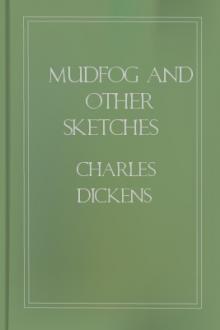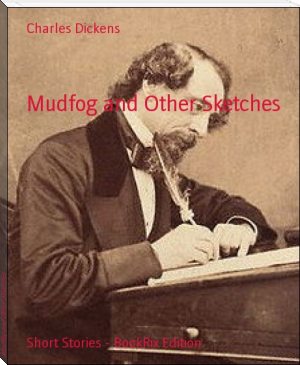Mudfog and Other Sketches by Charles Dickens (smallest ebook reader .txt) 📕

- Author: Charles Dickens
- Performer: -
Book online «Mudfog and Other Sketches by Charles Dickens (smallest ebook reader .txt) 📕». Author Charles Dickens
‘SUPPLEMENTARY SECTION, E.—UMBUGOLOGY AND DITCHWATERISICS.
President—Mr. Grub. Vice Presidents—Messrs. Dull and Dummy.
‘A paper was read by the secretary descriptive of a bay pony with one eye, which had been seen by the author standing in a butcher’s cart at the corner of Newgate Market. The communication described the author of the paper as having, in the prosecution of a mercantile pursuit, betaken himself one Saturday morning last summer from Somers Town to Cheapside; in the course of which expedition he had beheld the extraordinary appearance above described. The pony had one distinct eye, and it had been pointed out to him by his friend Captain Blunderbore, of the Horse Marines, who assisted the author in his search, that whenever he winked this eye he whisked his tail (possibly to drive the flies off), but that he always winked and whisked at the same time. The animal was lean, spavined, and tottering; and the author proposed to constitute it of the family of FITFORDOGSMEATAURIOUS. It certainly did occur to him that there was no case on record of a pony with one clearly-defined and distinct organ of vision, winking and whisking at the same moment.
‘MR. Q. J. SNUFFLETOFFLE had heard of a pony winking his eye, and likewise of a pony whisking his tail, but whether they were two ponies or the same pony he could not undertake positively to say. At all events, he was acquainted with no authenticated instance of a simultaneous winking and whisking, and he really could not but doubt the existence of such a marvellous pony in opposition to all those natural laws by which ponies were governed. Referring, however, to the mere question of his one organ of vision, might he suggest the possibility of this pony having been literally half asleep at the time he was seen, and having closed only one eye.
‘THE PRESIDENT observed that, whether the pony was half asleep or fast asleep, there could be no doubt that the association was wide awake, and therefore that they had better get the business over, and go to dinner. He had certainly never seen anything analogous to this pony, but he was not prepared to doubt its existence; for he had seen many queerer ponies in his time, though he did not pretend to have seen any more remarkable donkeys than the other gentlemen around him.
‘PROFESSOR JOHN KETCH was then called upon to exhibit the skull of the late Mr. Greenacre, which he produced from a blue bag, remarking, on being invited to make any observations that occurred to him, “that he’d pound it as that ‘ere ‘spectable section had never seed a more gamerer cove nor he vos.”
‘A most animated discussion upon this interesting relic ensued; and, some difference of opinion arising respecting the real character of the deceased gentleman, Mr. Blubb delivered a lecture upon the cranium before him, clearly showing that Mr. Greenacre possessed the organ of destructiveness to a most unusual extent, with a most remarkable development of the organ of carveativeness. Sir Hookham Snivey was proceeding to combat this opinion, when Professor Ketch suddenly interrupted the proceedings by exclaiming, with great excitement of manner, “Walker!”
‘THE PRESIDENT begged to call the learned gentleman to order.
‘PROFESSOR KETCH.—“Order be blowed! you’ve got the wrong un, I tell you. It ain’t no ‘ed at all; it’s a coker-nut as my brother-in-law has been a-carvin’, to hornament his new baked tatur-stall wots a-comin’ down ‘ere vile the ‘sociation’s in the town. Hand over, vill you?”
‘With these words, Professor Ketch hastily repossessed himself of the cocoa-nut, and drew forth the skull, in mistake for which he had exhibited it. A most interesting conversation ensued; but as there appeared some doubt ultimately whether the skull was Mr. Greenacre’s, or a hospital patient’s, or a pauper’s, or a man’s, or a woman’s, or a monkey’s, no particular result was obtained.’
‘I cannot,’ says our talented correspondent in conclusion, ‘I cannot close my account of these gigantic researches and sublime and noble triumphs without repeating a bon mot of Professor Woodensconce’s, which shows how the greatest minds may occasionally unbend when truth can be presented to listening ears, clothed in an attractive and playful form. I was standing by, when, after a week of feasting and feeding, that learned gentleman, accompanied by the whole body of wonderful men, entered the hall yesterday, where a sumptuous dinner was prepared; where the richest wines sparkled on the board, and fat bucks—propitiatory sacrifices to learning—sent forth their savoury odours. “Ah!” said Professor Woodensconce, rubbing his hands, “this is what we meet for; this is what inspires us; this is what keeps us together, and beckons us onward; this is the SPREAD of science, and a glorious spread it is.”’
THE PANTOMIME OF LIFE
Before we plunge headlong into this paper, let us at once confess to a fondness for pantomimes—to a gentle sympathy with clowns and pantaloons—to an unqualified admiration of harlequins and columbines—to a chaste delight in every action of their brief existence, varied and many-coloured as those actions are, and inconsistent though they occasionally be with those rigid and formal rules of propriety which regulate the proceedings of meaner and less comprehensive minds. We revel in pantomimes—not because they dazzle one’s eyes with tinsel and gold leaf; not because they present to us, once again, the well-beloved chalked faces, and goggle eyes of our childhood; not even because, like Christmas-day, and Twelfth-night, and Shrove-Tuesday, and one’s own birthday, they come to us but once a year;—our attachment is founded on a graver and a very different reason. A pantomime is to us, a mirror of life; nay, more, we maintain that it is so to audiences generally, although they are not aware of it, and that this very circumstance is the secret cause of their amusement and delight.
Let us take a slight example. The scene is a street: an elderly gentleman, with a large face and strongly marked features, appears. His countenance beams with a sunny smile, and a perpetual dimple is on his broad, red cheek. He is evidently an opulent elderly gentleman, comfortable in circumstances, and well-to-do in the world. He is not unmindful of the adornment of his person, for he is richly, not to say gaudily, dressed; and that he indulges to a reasonable extent in the pleasures of the table may be inferred from the joyous and oily manner in which he rubs his stomach, by way of informing the audience that he is going home to dinner. In the fulness of his heart, in the fancied security of wealth, in the possession and enjoyment of all the good things of life, the elderly gentleman suddenly loses his footing, and stumbles. How the audience roar! He is set upon by a noisy and officious crowd, who buffet and cuff him unmercifully. They scream with delight! Every time the elderly gentleman struggles to get up, his relentless persecutors knock him down again. The spectators are convulsed with merriment! And when at last the elderly gentleman does get up, and staggers away, despoiled of hat, wig, and clothing, himself battered to pieces, and his watch and money gone, they are exhausted with laughter, and express their merriment and admiration in rounds of applause.
Is this like life? Change the scene to any real street;—to the Stock Exchange, or the City banker’s; the merchant’s counting-house, or even the tradesman’s shop. See any one of these men fall,—the more suddenly, and the nearer the zenith of his pride and riches, the better. What a wild hallo is raised over his prostrate carcase by the shouting mob; how they whoop and yell as he lies humbled beneath them! Mark how eagerly they set upon him when he is down; and how they mock and deride him as he slinks away. Why, it is the pantomime to the very letter.
Of all the pantomimic dramatis personae, we consider the pantaloon the most worthless and debauched. Independent of the dislike one naturally feels at seeing a gentleman of his years engaged in pursuits highly unbecoming his gravity and time of life, we cannot conceal from ourselves the fact that he is a treacherous, worldly-minded old villain, constantly enticing his younger companion, the clown, into acts of fraud or petty larceny, and generally standing aside to watch the result of the enterprise. If it be successful, he never forgets to return for his share of the spoil; but if it turn out a failure, he generally retires with remarkable caution and expedition, and keeps carefully aloof until the affair has blown over. His amorous propensities, too, are eminently disagreeable; and his mode of addressing ladies in the open street at noon-day is downright improper, being usually neither more nor less than a perceptible tickling of the aforesaid ladies in the waist, after committing which, he starts back, manifestly ashamed (as well he may be) of his own indecorum and temerity; continuing, nevertheless, to ogle and beckon to them from a distance in a very unpleasant and immoral manner.
Is there any man who cannot count a dozen pantaloons in his own social circle? Is there any man who has not seen them swarming at the west end of the town on a sunshiny day or a summer’s evening, going through the last-named pantomimic feats with as much liquorish energy, and as total an absence of reserve, as if they were on the very stage itself? We can tell upon our fingers a dozen pantaloons of our acquaintance at this moment—capital pantaloons, who have been performing all kinds of strange freaks, to the great amusement of their friends and acquaintance, for years past; and who to this day are making such comical and ineffectual attempts to be young and dissolute, that all beholders are like to die with laughter.
Take that old gentleman who has just emerged from the Cafe de l’Europe in the Haymarket, where he has been dining at the expense of the young man upon town with whom he shakes hands as they part at the door of the tavern. The affected warmth of that shake of the hand, the courteous nod, the obvious recollection of the dinner, the savoury flavour of which still hangs upon his lips, are all characteristics of his great prototype. He hobbles away humming an opera tune, and twirling his cane to and fro, with affected carelessness. Suddenly he stops—‘tis at the milliner’s window. He peeps through one of the large panes of glass; and, his view of the ladies within being obstructed by the India shawls, directs his attentions to the young girl with the band-box in her hand, who is gazing in at the window also. See! he draws beside her. He coughs; she turns away from him. He draws near her again; she disregards him. He gleefully chucks





Comments (0)